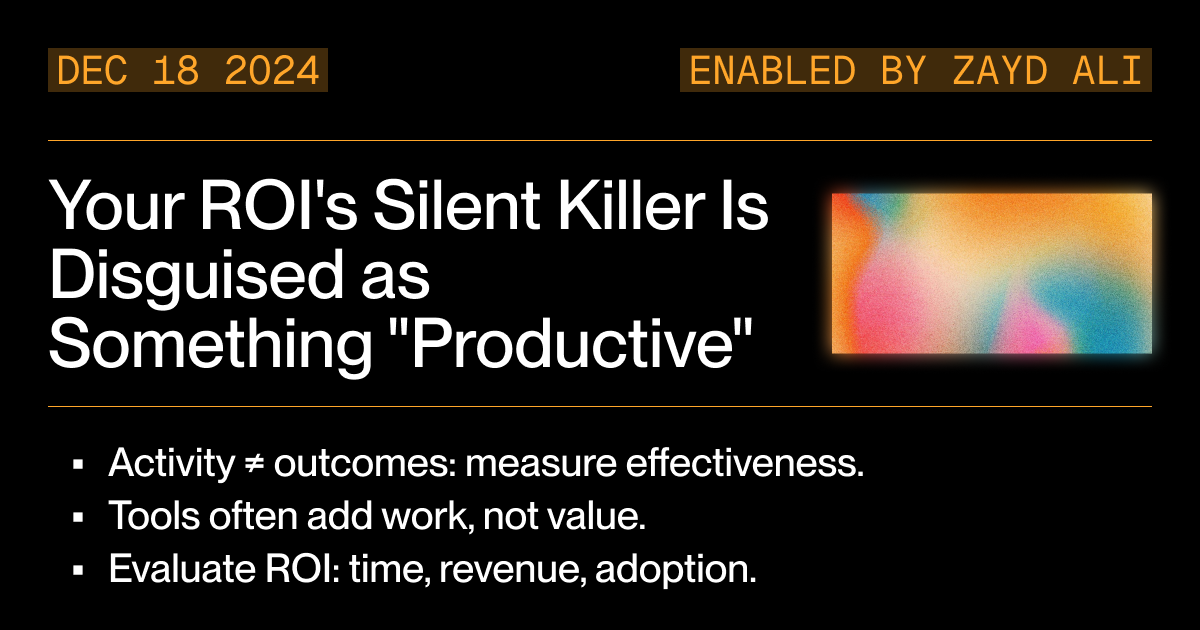What's up, it's Zayd.
Every VC-backed SaaS company out there is trying to convince you their tool is "mission-critical." My LinkedIn feed looks like a SaaS party where everyone's fighting to be the next Salesforce. (Spoiler: They won't be.)
But here's the thing—most sales teams are spending 80% of their budget on tools that drive 20% of their results. And worse? They're missing out on the few tools that could actually 10x their pipeline.
In today's newsletter, I'm breaking down why most sales tools fail to deliver ROI and how to think about what actually matters.
Forwarded this email? Get Enabled in your inbox each week.
Zayd’s Picks
My favorite finds of the week.
Default’s strategy for growing to $10m ARR in 2025 (link)
How to get inbound leads on LinkedIn (link)
Warm intro template to grow your pipeline (link)
Generate $440k with automated 2-touch warm outreach in 30 days (link)
Alex Hormozi’s secret to building a $100m sales team (link)
Key to a valuable lead magnet people can’t refuse (link)
Tools to generate 200+ demo calls every month (link)
The Truth About Tool ROI
The Activity Trap
There’s one massive mistake that most of us make:
Today, when conversation can feel like an Olympics of Who’s busier? Worked later? Is more exhausted? And things being “hard” has become some sort of badge of valor like—”Wow you actually made it to [insert wedding, networking happy hour, or pickleball hang here] when things are so difficult. Good on you!”
It’s all too easy to fall into the trap of measuring activity. How much are you doing, moving, hiring, acting? Over measuring the outcomes of these things.
Does any of that action actually convert into something that meets your goals?
Here's what most teams track:
Number of emails sent
Connection requests made
Calls logged
Tasks completed
Here's what actually matters:
Time from lead to meeting
Meeting show rate
Pipeline-to-close ratio
Customer acquisition cost
The difference? The first set tells you if people are busy. The second tells you if they're effective.
Why Most Tools Fail
A few weeks ago we touched on why the average SDR spends 37% of their day just managing tools. That's $28,000 per sales rep annually in lost productivity—like hiring someone to work Monday through Wednesday, then having them spend Thursday and Friday just updating spreadsheets.
After analyzing hundreds of tech stacks, here's why most tools don't deliver ROI:
They Create More Work Than They Solve
Require manual data entry
Need constant maintenance
Generate "insights" that need interpretation
Create new processes instead of simplifying existing ones
They're Solutions Looking for Problems
Built by engineers who've never sold
Solve edge cases instead of core workflows
Add complexity to simple tasks
Force teams to adapt to the tool instead of vice versa
They Don't Talk to Each Other
Create data silos
Require manual exports/imports
Have conflicting information
Force reps to be data janitors
Calculating Real ROI
Here's how to evaluate if a tool is worth it:
Calculate Time Saved
Track hours spent on tasks the tool would automate
Multiply by hourly cost of sales reps
Factor in onboarding and training time
Measure Revenue Impact
Track pipeline influenced by the tool
Calculate conversion rate improvement
Monitor deal velocity changes
Hidden Costs to Consider
Integration time with existing tools
Ongoing maintenance
Team adoption challenges
Context switching overhead
Next week, I'll break down the essential sales stack you actually need and share a framework for evaluating new tools. Stay tuned.
How I Can Help?
Let me book sales calls for you while you’re auditing your tech stack. Seriously.
I built Valley to be your automated SDR and empower AEs. Get started today and watch your calendar fill up with qualified leads.

